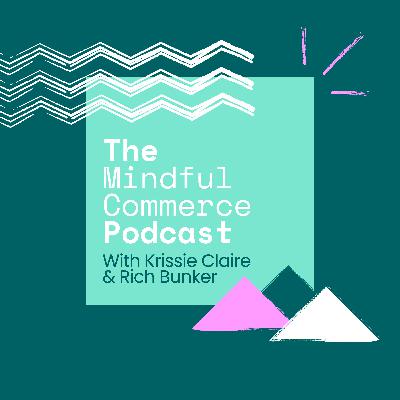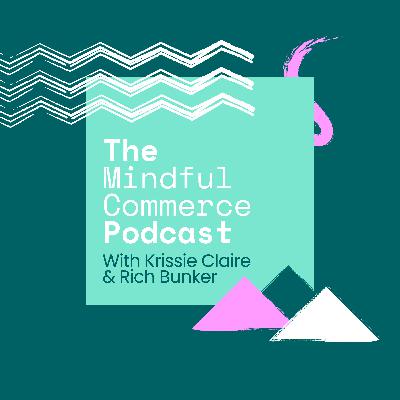#001 How to build & design a low carbon brand & website
Description
Find us:
- Head to our community page to register & join the MindfulCommerce community as an expert, brand or merchant
- Instagram: @mindfulcommerce
- Facebook @MindfulCommerce
- Contact Us - info@mindfulcommerce.io
Mentioned Links:
Precious Plastics
Organic Basics Low Impact Website
Mastodon - Twitter Alternative
Signal - WhatsApp Alternative
Ecosia - Google Alternative
Show notes:
Krissie Leyland 00:00
Hello, and welcome to episode number one of the MindfulCommerce podcast. In this episode, I Krissie, talk to Saskia and Nico from HeyLow, a creative studio designing and building low carbon brands. We talk about the disturbing fact that the internet is dirty, and every website has a digital carbon footprint. Saskia and Nico reveal some quick and long term wins to create a low carbon brand and website. This episode is super fascinating and might completely change your mindset about the internet. We hope you enjoy it as much as we did. If you have any thoughts or questions, please feel free to email us at info@mindfulcommerce.io. And as always, the full details will be in the show notes.
Welcome Saskia and Nico, I'll dive straight in! What made you decide to start offering low carbon web design as a service?
Saskia 00:56
So Nico, and I met at Precious Plastic, which was a year long project based in the Netherlands. We were designing and building open source machines to reduce plastic waste around the world. There was this huge community activism project but 70,000 users around the world. Anyway, Nico and I were both on the digital team. So I'm background UX, Nico's back UI and we actually worked on the digital tools together. And then, yeah, I mean, it was a year of really understanding, much deeper the climate crisis and how interconnected it is with all about different types of industries. Because we work on the web, and we had some much bigger explorations into it, and kind of finding out facts, like, the internet is actually more of a carbon producer in the sorry, then all of the airlines put together and, and so this is just like, not a narrative that we hear around what the internet is. And it really is just a large dumping ground for stuff that has to be powered by, basically dirty energy. So we decided to pair together and Nico can talk a little bit about it. He has a long background in low impact. But yeah, we just joined together because it seemed like the right thing to do. And yeah, it's been a really great response so far.
Krissie Leyland 02:23
That's amazing because yeah, you've never really think about your, well, I do now but I didn't used to think about my impact on the planet in terms of just googling something or, you know, landing on a website. You just think you can't see it, it's not physical, so you don't really think about it.
Nico 02:43
The story written around the internet, we talk a lot about the clouds. And like, it seems to be a wave, not like a physical thing. But actually, it is like it's a big spaces with a lot of computers, the servers and it takes like a lot of energies. And even you have to build the structure like the cables. You have to build the computers and charge your devices. And because it's like, digital and not something physical. We think it doesn't exist, actually. It's real.
Krissie Leyland 03:25
Yeah, exactly. And it's just, you know, I guess. So when did you first learn about low carbon websites?
Nico 03:36
So I don't remember exactly. But my side, I think it was like something like four years ago. And, then I loved the fact about like the the flight industry, the fact the internet is more carbon intensive than the oil industry. And actually, in the news, we talk only about frying, like, the shame of things that like that. And then when I thought about I was like "Wow, Oh my god, this is like, not amazing, the opposite". And I was like, wow, maybe I should do something about it. Because it's also my watch. And yeah, it was an idea in my mind, like for four years and learn a bit about that. And yes, Saskia already told, we met last year and at some point, it was like obvious. We have to do something and walk on that small and it's also like a great design exercise actually. Yeah, for designers, it's pretty cool. It's even more exciting like to design in another way.
Krissie Leyland 04:50
Yeah. One of the people that asked the question is actually a web designer and she's like, she's hosts her website on Square Space and was just like "Oh no, this is really bad." And so she asked the question of, you know, how, what are the simple, quick wins that a web designer can do or recommend to their clients to like improve their website that's already up and live?
Nico 05:21
So the first thing is the hosting. So it's where you put your websites, which server. And for that, then you need to be, the data centre need to be run on renewable energy. You save a really a lot of carbon by doing that. And it's kind of, like it's not really about the design of the website, that model structure. It's like when you're designing a product, a physical products, is like the sourcing of materials. Let's say it's like the equivalence, the equivalence with the websites is the server and the hosting services. This is really the first step.
Saskia 06:06
It's a little difficult when it comes, because places like SquareSpace. Obviously, they don't run on renewable energy and a lot of the really big, big conglomerates that exist in the internet space. Kind of, they're not very transparent around how they actually use energy for their data centres. So it's a little bit tricky. When it is just you know, we obviously use green hosting for all of our projects. But when you're using services like SquareSpace, or other ones, it's very hard to have control over that, unfortunately. Yeah, the hosting is the most important thing.
Nico 06:44
For example, there is a lot of services using Google Cloud Platform. I think actually should be fine to use it. And Google is claiming they are like 100%, green. But in the meantime, for events, they help oil company on the job, like to perform even more. So first, that means that Google is not green. And also they got data centres in the world were like, not running on green energy. And they came out green just because they're like, compensate. They offset the emission. And we don't think is the way to do it. Like, you can't really like you can't really claim you're green because you compensate. It's like it's kind of a real thing for us.
Krissie Leyland 07:40
So offsetting is like, a secondary option.
Saskia 07:45
Yeah, I mean, you can imagine what it takes to create the energy, you know, you're pulling something out of the earth, or the infrastructure that's created to pull that oil out of the earth, and then it goes through all these ginormously complex processes to be able to be performed into energy. You can't just plant a tree to take that energy out, you know, like, you're comparing the output of carbon by, you know, powering something versus actually the entire infrastructure. And we actually need to be able to move towards a much more green infrastructure. We need to be putting out dollars, you know, and into an opportunity that makes it easy for people to be like, "Okay, cool. Like, this is really valuable to the earth now." Because while I think offsetting programs can be beneficial, they are not equal to, yeah, what it takes the infrastructure and the damage that's created of pulling it out of the earth in the first place.
Krissie Leyland 08:42
Yeah, so being green first. So using the right server, like a green, do you call it a green server?
Saskia 08:52
Yeah, green hosting.
Nico 08:53
Yeah. We can call it that. We should already like, compensate the green energy, because even the green energy are emitting carbon. Yeah, actually. So yeah, like, green green, green energy.
Saskia 09:12
It's kind of impossible to be carbon free.
Krissie Leyland 09:14
Yeah. So then, I guess, at what point in a brand's journey then, should they think about, you know, being or choosing the right platform? You know, if they've already got a website in place, is that too late?
Saskia 09:31
I think that it is not fair to say that everybody should move to be green right now. I think that obviously, if they're, if there's the time and the space and the money to move, I think that's the right time. But you know, you have to be a financially viable business before you can have the investment for that. And I do really believe in small businesses and like a much more distributed economy. So I really admire people that run their own businesses, but I actually come from a long line of family businesses. I know, I know how hard it can be. But I mean, there's no, there's no real one time. I mean, whether you're a small young business, or whether you're ve












